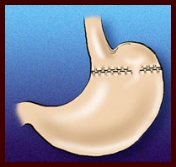back to testimonials back to WLS memorials
back to WLS memorials
Gastroplasty was stomach stapling, only and invented to be a safer procedure
than the JIB intestinal bypass or the RNY gastric bypass. It is less
invasive than the bypass surgeries since there is NO intestinal bypass, and
other than the modifications on the stomach, normal digestion is not supposed to
be affected and yet as you read through this account of a 30 year post op, you
may be surprised that even these small changes to the stomach can not only cause
a lot of pain on the long term but also CAN affect digestion and yet, for most
patients wasn't real effective at keeping the weight off. Vicki had
been ill for years for vitamin deficiencies and numerous repercussions of her
horizontal gastroplasty. She had a difficult time getting help from her
National Health Service (in Australia). Regrettably, in the end of April 2010,
she was found dead in her her son and DIL's home - they had left for the weekend
and came home to find their mother, deceased suddenly. The cause of death
was listed as "asphyxiation". Vicki was a very sweet lady who is very missed,
not only by her family but by all of those whose lives she touched.
She made her own website and it is still up - it is all Vicki, her artistic
qualities her personality. Vicki's website is no longer up as she passed away in
2010 but this page is kept as a memorial to her...
Long term WLS - Vicki Savage's story 30 years post op
by Vicki SavageThe operation I had when I was 18 years old, is what is called horizontal gastroplasty. I was actually the youngest person at that stage (1980) to have had the operation here in Australia. Quite a few people that I met back then had some very serious complications just after having thier surgery, including a couple of people who
actually died on the operating table and had to be revived. Another lady I met had to have a complete reversal within 12 months as she could not stop losing weight and could not keep any food done.
 The
gastroplasty was designed in the early 1970s to be a safer alternative to the
gastric bypass and the intestinal bypass (JIB). The operation itself was made
possible by the introduction of mechanical staplers. During World War
II, the Russians, as part of their war effort, developed a series of surgical
instruments which would staple various body tissues together as a simple and
rapid method of dealing with injuries. This concept was adapted and refined by
American surgical instrument makers after the war, leading to the surgical
stapling instruments in use today.
(1)
These are capable of laying down as many as four parallel rows of staples, to
create a partition, or the instrument comes with a knife blade which will cut
between the newly placed staple rows, dividing and sealing the stapled tissues
simultaneously. Other instruments place circular rows of staples which will
join two tubes end to end, very useful in connecting intestine together. The
gastroplasty was the first purely restrictive operation performed for the
treatment of obesity. The original (horizontal) gastroplasty involved stapling
the stomach into a small partition – and only leaving a small opening for food
to pass from the upper stomach pouch to the lower one. Thus the lay term –
stomach stapling. This form of gastroplasty resulted in very poor long-term
weight loss and, after several attempted modifications, was abandoned
eventually. (From the ASBMS story of obesity which was taken down with the
initiation of the new website)
The
gastroplasty was designed in the early 1970s to be a safer alternative to the
gastric bypass and the intestinal bypass (JIB). The operation itself was made
possible by the introduction of mechanical staplers. During World War
II, the Russians, as part of their war effort, developed a series of surgical
instruments which would staple various body tissues together as a simple and
rapid method of dealing with injuries. This concept was adapted and refined by
American surgical instrument makers after the war, leading to the surgical
stapling instruments in use today.
(1)
These are capable of laying down as many as four parallel rows of staples, to
create a partition, or the instrument comes with a knife blade which will cut
between the newly placed staple rows, dividing and sealing the stapled tissues
simultaneously. Other instruments place circular rows of staples which will
join two tubes end to end, very useful in connecting intestine together. The
gastroplasty was the first purely restrictive operation performed for the
treatment of obesity. The original (horizontal) gastroplasty involved stapling
the stomach into a small partition – and only leaving a small opening for food
to pass from the upper stomach pouch to the lower one. Thus the lay term –
stomach stapling. This form of gastroplasty resulted in very poor long-term
weight loss and, after several attempted modifications, was abandoned
eventually. (From the ASBMS story of obesity which was taken down with the
initiation of the new website)
As I said I was very young, and not really confident enough to ask the doctor too many questions but, in saying that he was not very forthcoming with any information either. All I was told, was that it was major surgery and that I would experience some pain afterwards.
I actually had 2 rows of staples inserted in order to stop the possibility of bursting or stretching, this was my doctor's recommendation. I was shown what they looked like after my surgery, they were a green looking hard plastic and looked like the clips ladies used to wear in their hair in the 1920's to 40's to make
their hair wave. They were, from memory, about 5 inches wide from left to right. Quite a large item i thought at the time.
When I awoke after the surgery, I felt like I was dying ... my mother even became hysterical when she saw me as she thought that I was going to die also.
I woke from my operation with a tube, that went into my nose and down my throat, into my stomach. From which the nurses, sucked fluids out of my stomach. I had a drainage tube in my left side that had , from memory, approximately 10 feet of gauze attached to it inside me. This was taken out gradually over a 3 day period, about a week after my operation. By the third day the pain was so horrible, and I was hysterical about it and had to have a local anesthetic to have the last of it removed. I had a lot of difficulty with pain ( even though I was being medicated for the best part of a week with morphine) causing me to only be able to breath in very short small breaths. Talking and crying caused pain, and coughing was hellish, and if I had a coughing problem they had to give me this medicine to stop the coughing immediately.
I had 22 stitches in my stomach that went from my breast bone to my navel, which made it very difficult to stand up straight, let alone walk. Going to the toilet, which was only about 15 feet from my room took me around 20 minutes, because of the discomfort, pain and shortness of breath.( going to the toilet was only allowed after a few days and prior to that I had a
catheter). I was supplied with a kick board at the end of my bed, so I could push myself upwards if I found myself sliding down the bed or caught in an uncomfortable position ... and also a triangular bar was hung above my bed so I could pull myself up on. Two nurses had to come and lift me every few hours and rub my back, so I did not get bed sores .. this was also very painful. All in all it was a nightmare.
I experienced a frightening amount of pain and discomfort during the ten days that I was in hospital and was quite
traumatized when I came home. After I had the surgery, my doctor informed me that he had done an experimental procedure as well as the gastroplasty and had narrowed my esophagus. This was done without my prior consent and has been a great source of problems for me for 27 years now. It causes me to have food that gets caught in my throat, in particular, red meat, cold chicken, rice or pasta, after which I cant get any fluids done my throat. And I have to force myself to vomit so it will move. Vomiting is not easy for me, so I dread getting sick and when I was
pregnant I nearly choked when suffering with morning sickness.
 I made inquiries years ago about having the staples removed and having my esophagus fixed but I was told that this operation would be every bit as horrific as having the surgery in the first place. I was far too frightened to go through it again so I decided to just put up with it.
I made inquiries years ago about having the staples removed and having my esophagus fixed but I was told that this operation would be every bit as horrific as having the surgery in the first place. I was far too frightened to go through it again so I decided to just put up with it.
Within 12 months of having the surgery I ended up experiencing some really severe pain and had to have a doctor come to my house on several occasions to give me pain killing injections, because I was nearly going out of my mind with pain. He referred me back to the surgeon who did my gastroplasty and it turns out that he also failed to tell me that I could end up with gall stones and a ruptured appendix as an after effect of the surgery. I was put back into hospital and had my appendix and 22 gall stones removed.
I only ever lost 2 stone (28 pounds) after having the surgery, even though I was not able to eat anymore than what would fit on a tea cup saucer for the best part of 3 years. I ended up going to see my family doctor who tried giving me several different diets to try for 3 years and still I lost no more weight, and in some circumstances I put a little bit back on, even when my calorie intake was cut back to 500 calories per day.
In 1986, my marriage ended and I was very frustrated about my weight so I ended up practically starving myself for 12 months and doing a
phenomenal amount of exercise for 12 months and eventually lost 8 stone
(112 lbs). But as soon as I started eating again, it all just went back on. I suppose I sort of gave up by then, but was still not able to eat very much at all. And doing so only helped me to maintain a specific weight. My weight was up and down for years but it was a real struggle.
 In 1993 I became pregnant with my last child and ended up with gestational diabetes and then after I had my daughter my health started to slowly decline. by 1999 I was experiencing really bad fatigue and would fall into a sleep state that my children found hard to wake me from. I was feeling very weak and shaky and I stated having problems with my eyes being very sensitive to light, so I started wearing sunglasses quite a lot. I went to the doctor and was diagnosed with hypoglycemia (low blood sugar) but was not given any treatment for it.
In 1993 I became pregnant with my last child and ended up with gestational diabetes and then after I had my daughter my health started to slowly decline. by 1999 I was experiencing really bad fatigue and would fall into a sleep state that my children found hard to wake me from. I was feeling very weak and shaky and I stated having problems with my eyes being very sensitive to light, so I started wearing sunglasses quite a lot. I went to the doctor and was diagnosed with hypoglycemia (low blood sugar) but was not given any treatment for it.
These problems persisted on and off for the next few years and then worsened in 2005 and I was then diagnosed with type 2 diabetes and put on medication. My diabetes has been very unstable since then although my 3 monthly blood tests do not indicate this ... my daily blood sugar readings go up and down quite dramatically during the coarse of a day. Anywhere from a 3 to a 14.7. I was taken to hospital in an ambulance in 2007 early, with a reading of 27.
I tried walking and dieting again although more sensibly this time but as fast as I took weight off it would go straight back on again, without any logical explanation.
I got to the point where I was unable to work a full time job and had to take a small part time job.
In the past 12 months I have been suffering with heart palpitations, sweating, burning feet, muscle weakness, very bad fatigue, confusion, dizziness, a sense of balance loss, stabbing pains in my stomach. My teeth have been breaking for years now. Also, I have dry eyes, tingling in my hands and feet, muscle stiffness and soreness,
diarrhea after eating, bloating, distention of my stomach, wild weight fluctuations - up and down by a few pounds in a matter of days, insomnia and then excessive need to sleep.
I don't actually go to sleep properly - just can't move a muscle for at least an hour sometimes longer. I have a very bad acidic taste in my mouth all the time, nausea.
Sometimes, my vision gets blurry, and I feel so incoherent that I am too frightened to drive. I have anxiety attacks when I am out too long or in crowed shopping centres, get exhausted after a small amount of activity, sometimes have trouble getting out of chairs or getting up off the floor - have to be assisted.
On some days, I become very shaky. I also have trouble with my speech at times - slurring my words or not being able to compute an answer to a question quickly, sometimes I have the answer in my head but it does not transfer to my mouth for a while, poor concentration, memory loss ... and this goes on for large stretches of time and then I might get a week or two when I feel a bit normal.
Additionally I now suffer: frequency of urination, bumping into people and things, restless legs in bed, severe leg and and foot cramping, lower back pain, feeling hot - then suddenly feeling cold, difficulty opening eyes after sleep, dropping things or knocking things over, sharp stabbing pains in my stomach, vagueness, sudden feelings of complete exhaustion - what I call "crashing", sensitivity to load noises or too much noise stimulation, feeling dissoriented, difficulty waking up mentally and physically, trouble focusing on words when reading, puffiness in my face, eyes and neck, weakness in my arms - have difficulty lifting arms above my head for too long - doing hair or getting washing off line,
occasional sudden jerking reflexes, difficulty carrying things. In the past 6 months I have also had very erratic menstrual cycles and very sore breasts.
I have been seeing a doctor regularly for about 12 months now and had a lot of tests done ... they have tried to test me for myasthenia gravis but the testing for this is not always conclusive, so I am about to see a diagnostic surgeon to have tests done for Multiple Sclerosis. I stumbled across the information about Post gastrectomy on the net by chance and it seemed to make sense.
Prior to the past 10 years I had reasonably good health and probably only attended a doctors appointment once every two or three years. I am only 47 years old and I feel like an 80 year old woman most of the time. My doctor has had me taking tablets for depression for the past 3 months ( first Lovan - which made my symptoms worse, and now I am on Efexor) as she said that they help to stimulate the receptors in the brain, this has only helped very minimally. For my diabetes, I take Diaformin and Glichlazide, I also take mild aspirin for my blood, and up until 6 months ago I had been
 taking Lipitor for
cholesterol (which was ok anyway but doctor wanted to get it as low as possible). I stopped taking the Lipitor myself due to money issues and when I did the heart palpitations that I was having everyday stopped.
taking Lipitor for
cholesterol (which was ok anyway but doctor wanted to get it as low as possible). I stopped taking the Lipitor myself due to money issues and when I did the heart palpitations that I was having everyday stopped.
At this point I am only working an average of 4 hours per week, in 2 hour shifts in a job that is not too physically demanding. A few weeks ago I had to work an extra 20 hours in one week and it took me 10 days to get over it. During which, I spent most of the time sleeping.
I'm just at a point in my life where I want some answers and I want to be able to have some kind of proper quality of life again. I was a single parent for 22 years and recently remarried in 2005, I should be able to have a reasonably good life at this stage in life but I am bogged down with these health problems. Which is more difficult to deal with because my husband has been ill also.
(Post gastrectomy syndrome can cause lack of B12 digestion because the stomach no longer produces "intrinsic factor" as well as "atrophic gastritis" a condition in which the chief and parietal cells of the stomach, the ones which produce many enzymes and also stomach acid, can atrophy and/or die. Gastroparesis can also be experienced. ANYONE WHO HAS HAD A GASTRECTOMY
or stomach stapling, is at risk for this syndrome in the long run)
return to Obesity Surgery Information Center
 The
gastroplasty was designed in the early 1970s to be a safer alternative to the
gastric bypass and the intestinal bypass (JIB). The operation itself was made
possible by the introduction of mechanical staplers. During World War
II, the Russians, as part of their war effort, developed a series of surgical
instruments which would staple various body tissues together as a simple and
rapid method of dealing with injuries. This concept was adapted and refined by
American surgical instrument makers after the war, leading to the surgical
stapling instruments in use today.
(1)
These are capable of laying down as many as four parallel rows of staples, to
create a partition, or the instrument comes with a knife blade which will cut
between the newly placed staple rows, dividing and sealing the stapled tissues
simultaneously. Other instruments place circular rows of staples which will
join two tubes end to end, very useful in connecting intestine together. The
gastroplasty was the first purely restrictive operation performed for the
treatment of obesity. The original (horizontal) gastroplasty involved stapling
the stomach into a small partition – and only leaving a small opening for food
to pass from the upper stomach pouch to the lower one. Thus the lay term –
stomach stapling. This form of gastroplasty resulted in very poor long-term
weight loss and, after several attempted modifications, was abandoned
eventually. (From the ASBMS story of obesity which was taken down with the
initiation of the new website)
The
gastroplasty was designed in the early 1970s to be a safer alternative to the
gastric bypass and the intestinal bypass (JIB). The operation itself was made
possible by the introduction of mechanical staplers. During World War
II, the Russians, as part of their war effort, developed a series of surgical
instruments which would staple various body tissues together as a simple and
rapid method of dealing with injuries. This concept was adapted and refined by
American surgical instrument makers after the war, leading to the surgical
stapling instruments in use today.
(1)
These are capable of laying down as many as four parallel rows of staples, to
create a partition, or the instrument comes with a knife blade which will cut
between the newly placed staple rows, dividing and sealing the stapled tissues
simultaneously. Other instruments place circular rows of staples which will
join two tubes end to end, very useful in connecting intestine together. The
gastroplasty was the first purely restrictive operation performed for the
treatment of obesity. The original (horizontal) gastroplasty involved stapling
the stomach into a small partition – and only leaving a small opening for food
to pass from the upper stomach pouch to the lower one. Thus the lay term –
stomach stapling. This form of gastroplasty resulted in very poor long-term
weight loss and, after several attempted modifications, was abandoned
eventually. (From the ASBMS story of obesity which was taken down with the
initiation of the new website) back to WLS memorials
back to WLS memorials I made inquiries years ago about having the staples removed and having my esophagus fixed but I was told that this operation would be every bit as horrific as having the surgery in the first place. I was far too frightened to go through it again so I decided to just put up with it.
I made inquiries years ago about having the staples removed and having my esophagus fixed but I was told that this operation would be every bit as horrific as having the surgery in the first place. I was far too frightened to go through it again so I decided to just put up with it. In 1993 I became pregnant with my last child and ended up with gestational diabetes and then after I had my daughter my health started to slowly decline. by 1999 I was experiencing really bad fatigue and would fall into a sleep state that my children found hard to wake me from. I was feeling very weak and shaky and I stated having problems with my eyes being very sensitive to light, so I started wearing sunglasses quite a lot. I went to the doctor and was diagnosed with hypoglycemia (low blood sugar) but was not given any treatment for it.
In 1993 I became pregnant with my last child and ended up with gestational diabetes and then after I had my daughter my health started to slowly decline. by 1999 I was experiencing really bad fatigue and would fall into a sleep state that my children found hard to wake me from. I was feeling very weak and shaky and I stated having problems with my eyes being very sensitive to light, so I started wearing sunglasses quite a lot. I went to the doctor and was diagnosed with hypoglycemia (low blood sugar) but was not given any treatment for it.  taking Lipitor for
cholesterol (which was ok anyway but doctor wanted to get it as low as possible). I stopped taking the Lipitor myself due to money issues and when I did the heart palpitations that I was having everyday stopped.
taking Lipitor for
cholesterol (which was ok anyway but doctor wanted to get it as low as possible). I stopped taking the Lipitor myself due to money issues and when I did the heart palpitations that I was having everyday stopped.